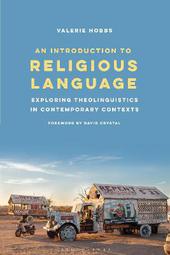
|
An Introduction to Religious Language: Exploring Theolinguistics in Contemporary Contexts
Hardback
Main Details
| Title |
An Introduction to Religious Language: Exploring Theolinguistics in Contemporary Contexts
|
| Authors and Contributors |
By (author) Dr Valerie Hobbs
|
| Physical Properties |
| Format:Hardback | | Pages:240 | | Dimensions(mm): Height 234,Width 156 |
|
| Category/Genre | Sociolinguistics
Semantics
Religion - general |
|---|
| ISBN/Barcode |
9781350095755
|
| Classifications | Dewey:210.14 |
|---|
| Audience | | Tertiary Education (US: College) | |
|---|
|
Publishing Details |
| Publisher |
Bloomsbury Publishing PLC
|
| Imprint |
Bloomsbury Academic
|
| Publication Date |
14 January 2021 |
| Publication Country |
United Kingdom
|
Description
Religious language is all around us, embedded in advertising, politics and news media. This book introduces readers to the field of theolinguistics, the study of religious language. Investigating the ways in which people talk to and about God, about the sacred and about religion itself, it considers why people make certain linguistic choices and what they accomplish. Introducing the key methods required for examining religious language, Valerie Hobbs acquaints readers with the most common and important theolinguistic features and their functions. Using critical corpus-assisted discourse analysis with a focus on archaic and other lexical features, metaphor, agency and intertextuality, she examines religious language in context. Highlighting its use in both expected locations, such as modern-day prayer and politics, and unexpected locations including advertising, sport, healthcare and news media, Hobbs analyses the shifting and porous linguistic boundaries between the religious and the secular. With discussion questions and further readings for each chapter, as well as a companion website featuring suggested answers to the reflection tasks, this is the ideal introduction to the study of religious language.
Author Biography
Valerie Hobbs is Senior Lecturer in Applied Linguistics at the University of Sheffield, UK.
ReviewsWhat a text states in words can be superficially read and supposedly understood, but what a text encodes and performs with what it states is another. Especially so when it is religious language. In this groundbreaking and paradigm forming work, Valerie Hobbs explores the potency - redemptive and destructive - of religious language and provides for many of us a new way of thinking about what we read and what we write. Theologians may find themselves hiding from her words. * Scot McKnight, Professor of New Testament, Northern Seminary, USA * An original and refreshing analysis, all the more stunning for its organizational clarity. By exploring the ways religious language is defined, used, and interpreted both within and beyond religious contexts, Hobbs provides readers with a surprisingly robust model for understanding how religious discourse can be identified and unpacked in communicative encounters across the world. * Flagg Miller, Professor of Religious Studies, University of California, Davis, USA * If you think a book about religious language is not for you, think again. This is a captivating and accessible analysis of the way in which we express our hopes, fears and the things we hold sacred. Ranging across religious and secular terrain, it explores examples from the political use of biblical texts to adverts and sermons which draw on the language of the divine, destiny and death. * Kim Knott, Professor Emerita of Religious and Secular Studies, Lancaster University, UK * As well as being an excellent introductory textbook to religious language, this book advances our understanding of religious language and how it pervades many aspects of our lives from politics to pop music. It gives a clear and concise introduction to religious language, clear methods for analysing it, and a rich array of well-worked examples. Hobbs' book will be invaluable to students of religious language and is a superb example of how to analyse language in contemporary contexts. * Michael Farrelly, Senior Lecturer in English Language, University of Hull, UK * A well-written, accessible, interesting, and above all, essential contribution to the growing field of Language and Religion ... and a valuable addition to any personal or institutional library. * Discourse Studies * Useful features of this book include further reading and discussion questions at the end of each chapter. This book would be a useful resource for students and researchers studying religious language in contemporary contexts. * Language in Society *
|